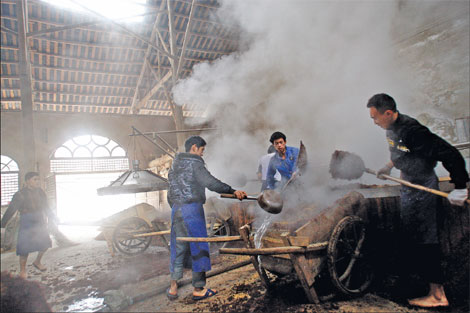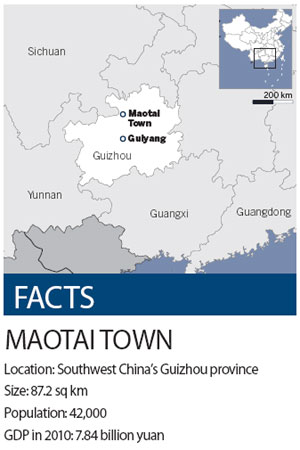One town's indomitable spirit

|
A large number of locals work for distilleries in Maotai. Zhang Wei / China Daily |
More than half the population of remote Maotai produces the legendary national liquor of China
If Maotai, the clear Chinese spirit that is also the national liquor of China, ever needed a spokesman, 34-year-old Zhao Yingcong would be a shoe-in. "Every Chinese believes drinking the proper amount (of Maotai) is good for health," says Zhao, a resident of Zunyi in Guizhou province. "It may get you drunk, but you never have a headache the next morning."
Across China, drinkers are reveling in Maotai, classified as a sauce-fragrance baijiu (white spirit) because it has a soy sauce-like aroma that lingers in the mouth. There are more than 10,000 tons of the pure and mellow liquor produced annually. It has been the drink of choice in many historic occasions in China. In 1984, during the signing ceremony for the handover of Hong Kong to China, Deng Xiaoping and Margaret Thatcher toasted over Maotai.
But in a country of more than 1.3 billion people, what most drinkers around the world don't know is that more than a third of the output is made in a small town of about 42,000 aficionados of baijiu. Of the 42,000 residents in this town, half run a business that sells or produces the fiery spirit.
The town, of course, is called Maotai.
In this town, located in the city of Renhuai in the southwestern province of Guizhou, there are 144 licensed liquor manufacturers, says Ni Kelong, a press officer with the Maotai Town government. Because of the massive production of both Maotai and other types of baijiu, the town had a per capita income of nearly 7,000 yuan ($1,100, 840 euros) in 2011. That ranks higher than most towns in the province.
The main producer of Maotai that has contributed to most of the town's per capita has also somewhat taken the namesake of the liquor: China Kweichow Moutai Distillery Co. Most Chinese people, however, call the brand by (take a quick guess) Moutai.
The company distinguishes itself with a different spelling of the pungent liquor.
|
|
"More than 8,000 locals (in Maotai) are working for (the distillery)," Ni says.
Guizhou province has a very long history of producing wines and liquors but in the remote town of Maotai, locals have been dedicated to producing China's most successful baijiu for the past decade.
The current liquor culture emerged in Maotai in the 1930s, when the town was a transport hub for the trade of salt along the Chishui River that runs through the town. "Salt dealers from Shaanxi and Sichuan provinces traveling along the river found this wonderland, spread the liquor culture and even settled business here," Ni says.
The town is surrounded by three mountains with the Chishui dividing the basin into two parts. This valley produces the ideal humidity and temperature to make the liquor.
One of the reasons why this special type of liquor has become a favorite in China is because of the unique process involved in making Maotai. Sauce-fragrance liquor generally is produced from rough alcohol made with high-quality wheat, locally produced sorghum and water from the Chishui. The traditional method involves at least eight cycles of fermentation and nine rounds of high-temperature distillation under strict conditions before the batches are stored in jars.
Today's Top News
- Xi calls for promoting volunteer spirit to serve national rejuvenation
- Xi chairs CPC meeting to review report on central discipline inspection
- Reunification will only make Taiwan better
- Outline of Xi's thought on strengthening military published
- Targeted action plan to unleash consumption momentum
- Separatist plans of Lai slammed
































